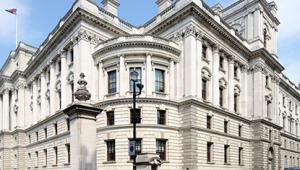By Richard Johnstone | 1 November 2012
Auditors have qualified the Whole of Government Accounts for the second consecutive year due to ‘significant issues’ with the quality and consistency of the data used in the financial statements.
 The 2010/11 WGA is the second consolidated set of accounts showing the financial position of the whole of the public sector.
The 2010/11 WGA is the second consolidated set of accounts showing the financial position of the whole of the public sector.
In its report on the accounts, published yesterday, the National Audit Office said that concerns raised in the audit of the first set of accounts, such as the exclusion of Network Rail, remained.
In total, the 2010/11 figures were qualified by auditors on six grounds, including the valuation basis used for local authority infrastructure assets. Councils value these assets on a historic cost basis, which, whilst compatible with International Financial Reporting Standards, is inconsistent with the basis used by central government. Auditor general Amyas Morse said the Treasury was unable to adjust for this.
Significant issues were also raised regarding the quality and consistency of the data provided by the health and education sectors, including concerns over the ‘completeness’ of the valuation of school assets.
Morse urged the government to produce the WGA quicker, highlighting that ‘these accounts were completed 19 months after the end of the financial year to which they relate’. Faster production of the figures would allow the WGA to be more widely used for financial planning in Whitehall, he said.
However, the audit report also stated that in the ‘limited’ time to make changes, the 2010/11 WGA had been improved compared to the previous year. More bodies, such as the Bank of England, are included, and most of the accounting standards used by local government have been brought into line with those used by central government.
Morse added: ‘The Whole of Government Accounts is a key means through which Parliament and the public can hold government to account for the money it spends and the activities it undertakes.
‘I hope that the WGA will provide the Treasury with the means to identify and manage key risks to the government’s financial position. To do this effectively, the Treasury must do more to improve these accounts. This includes producing them faster, and ensuring that all bodies owned and controlled by the government, such as Network Rail, are included.’
The WGA shows that over 2010/11, the government significantly reduced its overall annual deficit – the difference between expenditure and revenue – from £163bn to £94bn. But government’s overall net liability – the difference between what government owes and owns – remained at £1.2 trillion, due to a reduction in the public sector pension liability being offset by a rise in government borrowing.
CIPFA today welcomed the publication of the audit, saying the 2010/11 WGA represented a further increase in the transparency of public finances. The qualified opinion was ‘expected’, CIPFA noted.
The institute added that the WGA had been published a month earlier than last year, and an even earlier certification is an objective for 2011/12.
Paul Mason, CIPFA’s assistant director for central government, said: ‘The publication of the second Whole of Government Accounts shows encouraging progress but also that there is still a long way to go. The need for this information has never been greater, and we encourage all interested parties to support the Treasury as they further develop WGA.’



Auditors have qualified the Whole of Government Accounts for the second consecutive year due to ‘significant issues’ with the quality and consistency of the data used in the financial statements.

Credit: iStock
In its report on the accounts, published yesterday, the National Audit Office said that concerns raised in the audit of the first set of accounts, such as the exclusion of Network Rail, remained.
In total, the 2010/11 figures were qualified by auditors on six grounds, including the valuation basis used for local authority infrastructure assets. Councils value these assets on a historic cost basis, which, whilst compatible with International Financial Reporting Standards, is inconsistent with the basis used by central government. Auditor general Amyas Morse said the Treasury was unable to adjust for this.
Significant issues were also raised regarding the quality and consistency of the data provided by the health and education sectors, including concerns over the ‘completeness’ of the valuation of school assets.
Morse urged the government to produce the WGA quicker, highlighting that ‘these accounts were completed 19 months after the end of the financial year to which they relate’. Faster production of the figures would allow the WGA to be more widely used for financial planning in Whitehall, he said.
However, the audit report also stated that in the ‘limited’ time to make changes, the 2010/11 WGA had been improved compared to the previous year. More bodies, such as the Bank of England, are included, and most of the accounting standards used by local government have been brought into line with those used by central government.
Morse added: ‘The Whole of Government Accounts is a key means through which Parliament and the public can hold government to account for the money it spends and the activities it undertakes.
‘I hope that the WGA will provide the Treasury with the means to identify and manage key risks to the government’s financial position. To do this effectively, the Treasury must do more to improve these accounts. This includes producing them faster, and ensuring that all bodies owned and controlled by the government, such as Network Rail, are included.’
The WGA shows that over 2010/11, the government significantly reduced its overall annual deficit – the difference between expenditure and revenue – from £163bn to £94bn. But government’s overall net liability – the difference between what government owes and owns – remained at £1.2 trillion, due to a reduction in the public sector pension liability being offset by a rise in government borrowing.
CIPFA today welcomed the publication of the audit, saying the 2010/11 WGA represented a further increase in the transparency of public finances. The qualified opinion was ‘expected’, CIPFA noted.
The institute added that the WGA had been published a month earlier than last year, and an even earlier certification is an objective for 2011/12.
Paul Mason, CIPFA’s assistant director for central government, said: ‘The publication of the second Whole of Government Accounts shows encouraging progress but also that there is still a long way to go. The need for this information has never been greater, and we encourage all interested parties to support the Treasury as they further develop WGA.’




















